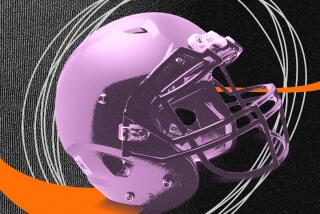Old ‘Cat Purring More These Days : College football: Encino’s Don Kruger, 76, Northwestern quarterback in ‘40s, gleefully follows alma mater’s new direction.
- Share via
ENCINO — The Chicago Daily News once called him a “daring field general willing to gamble.”
In another story, he was described as an enforcer on the basketball court, capable of preventing opponents from using “alley rules” in games.
Don Kruger smiles at the memories, preserved in the yellowed pages of his scrapbook.
Today, the gray-haired Kruger bears little resemblance to the rugged athlete who played for Northwestern’s football and basketball teams from 1939-42.
At 76, however, his competitive fire still burns, even if the flame flickered a little while he endured year after year of losing Northwestern football teams.
“I follow them, and I suppose if they don’t do well, I die a little bit,” said Kruger, who has lived in Encino since 1957. “Maybe I’m better than the cat with nine lives.”
These days, Kruger is living it up.
With Northwestern playing in the Rose Bowl for the first time since 1949, Kruger is one of many old Wildcats rejoicing in their alma mater’s reversal of fortune. He plans to attend his first Rose Bowl on New Year’s Day, when the third-ranked Wildcats (10-1) take on USC (8-2-1).
It will be the first time he has attended a Northwestern game since the late 1940s.
Of course, he hasn’t missed much in that time. The Wildcats have had only seven winning seasons since 1952, and this year’s team is the first to post a winning record since 1971.
“It’s like a guy who went from poverty to fame,” Kruger said of the current team. “This coach [Gary Barnett] must be a great motivator and a great psychologist. I hope he stays there. It’s fun to watch their progress.
“They’ve had such a wonderful season. It made a lot of people happy to watch another team [win]. It added some spice and interest to the college game. Everybody around the country was watching them.”
Kruger wasn’t able to watch many Northwestern games on television this season, but he paid special attention to Michigan’s upset over Ohio State that put the Wildcats in the Rose Bowl.
“I couldn’t believe that Michigan beat Ohio State,” he said. “That was the crowning blow that made the whole thing worthwhile. It’s a rags-to-riches story.”
Kruger’s story is a successful one as well.
He played football in the days when players wore leather helmets without facemasks, before the two-platoon system of substitution.
“We went both ways,” he said. “Sometimes it was a pretty tough afternoon.”
Kruger was Northwestern’s quarterback for the 1940 and ’41 seasons, helping the Wildcats to records of 6-2 and 5-3, respectively. He wore jersey No. 51 as a junior, changing to No. 21 as a senior.
One of the highlights of his career came in 1940 when he engineered a 20-0 victory over mighty Notre Dame before a capacity crowd at Northwestern.
Because teams rarely passed in that era, Kruger’s main responsibilities were to call the plays and block for the running backs. A photograph in the Chicago Herald-American in 1941 shows Kruger taking down two Wisconsin defenders to spring halfback Bob DeCorrevont for a 55-yard touchdown run in the Wildcats’ 41-14 victory.
Northwestern’s offensive stars that season were DeCorrevont, nicknamed the Blond Bullet, and sophomore halfback Otto Graham, who finished third in the Heisman Trophy voting as a senior in 1943 and became a Hall of Fame quarterback with the Cleveland Browns. DeCorrevont died a few months ago, Kruger said.
“We were winning, and that was fun,” Kruger recalled. “Half of our team was from the Chicago area. We got a bunch of good ones.”
Kruger went to Northwestern after a stellar prep career at Fenwick High in the Chicago suburb of Oak Park. Aside from his exploits as a halfback in football, he was student body president for three years and played four seasons of varsity basketball, leading Fenwick to the National Catholic championship as a junior in 1937. “Everybody [at Fenwick] wanted me to go to Notre Dame, particularly the priests,” he said. But Kruger spurned the Irish, along with several other schools, including USC, to attend Northwestern. He majored in liberal arts.
Asked about his athletic prowess, Kruger said, “I don’t know where I got it because both my parents were small and nobody in my family was athletic.”
In college, Kruger was 6 feet and weighed 185 pounds. He’s a little shorter and about 10 pounds lighter than that today, but he still fits nicely into the blue Northwestern warm-up sweater issued to him during the 1941 football season.
After graduating from college in 1942, Kruger joined the Navy during World War II and was assigned to 30-day officers’ training at the Naval Academy in Annapolis, Md.
His first assignment as a Naval aviation training officer took him to Iowa City, home of the University of Iowa. That’s where he met his wife, Marjette, an Iowa coed, and continued to play football on the Iowa Pre-Flight team. The Krugers, who have two sons, will celebrate their 52nd wedding anniversary in May.
Kruger remained stateside for the rest of the war, leaving the Navy with the rank of lieutenant.
After abandoning plans to attend law school, Kruger eventually went into the import business. He became a vice president with a New York-based company that imported liquor, retiring in the early 1980s after a 30-year career. He now works as a real estate agent.
Kruger says he still enjoys watching football but liked it better in the old days.
“I shudder when I see how the game is played today, with so many specialists,” he said. “You have to be a specialist just to play.”
Kruger also dislikes the way coaches have taken away play-calling duties from quarterbacks by shuttling in plays with substitutes.
“When we played, if there was a substitution, the substitute had to stand off from the huddle and the referee would stand with him so he couldn’t transmit a play,” he said. “He wasn’t involved in the play until after it was called.”
At Northwestern, Kruger earned a reputation for imaginative play-calling. One newspaper referred to him as the “brains of the 1941 Purple team.”
“It used to be a player’s game,” he said. “You rose or fell on what you did on the field. I called all the plays, every one of them.”
With that, Marjette Kruger offered her own observation.
“And he hasn’t called one since,” she said.
More to Read
Go beyond the scoreboard
Get the latest on L.A.'s teams in the daily Sports Report newsletter.
You may occasionally receive promotional content from the Los Angeles Times.










